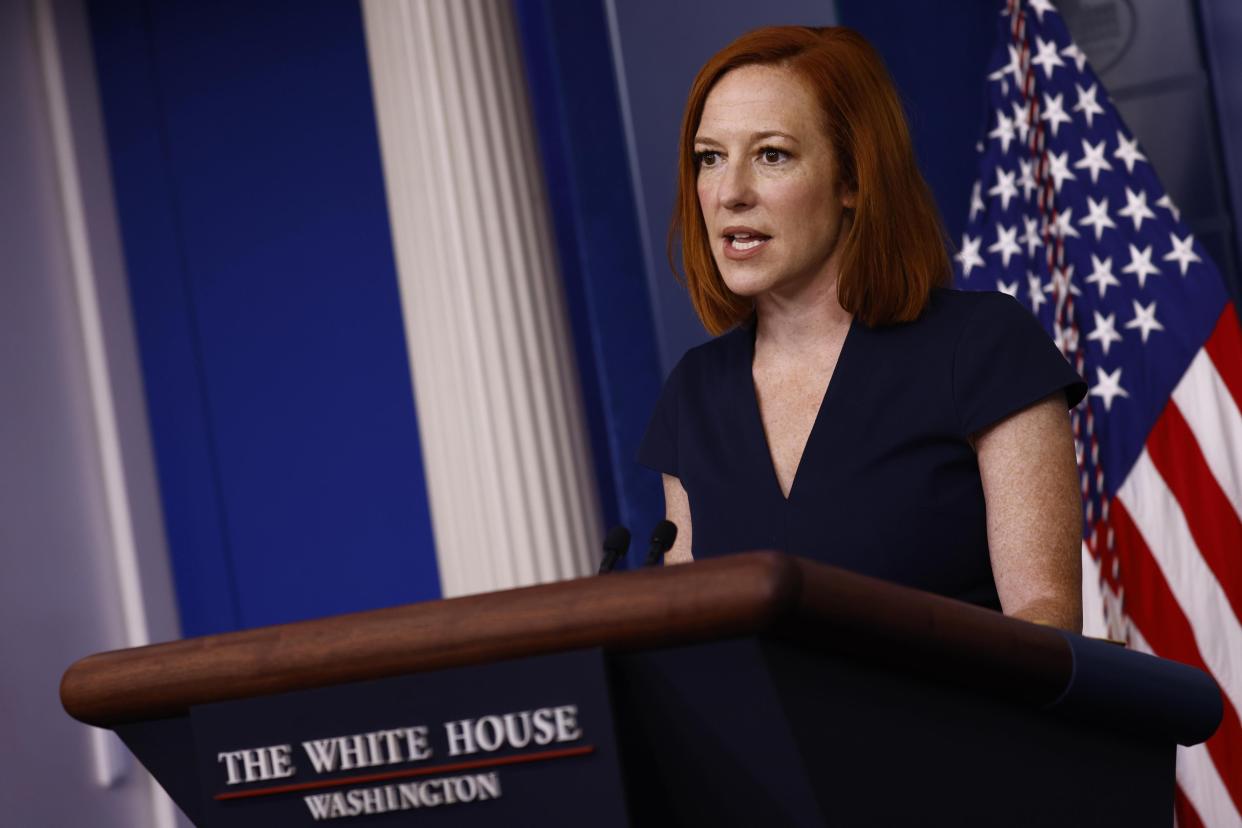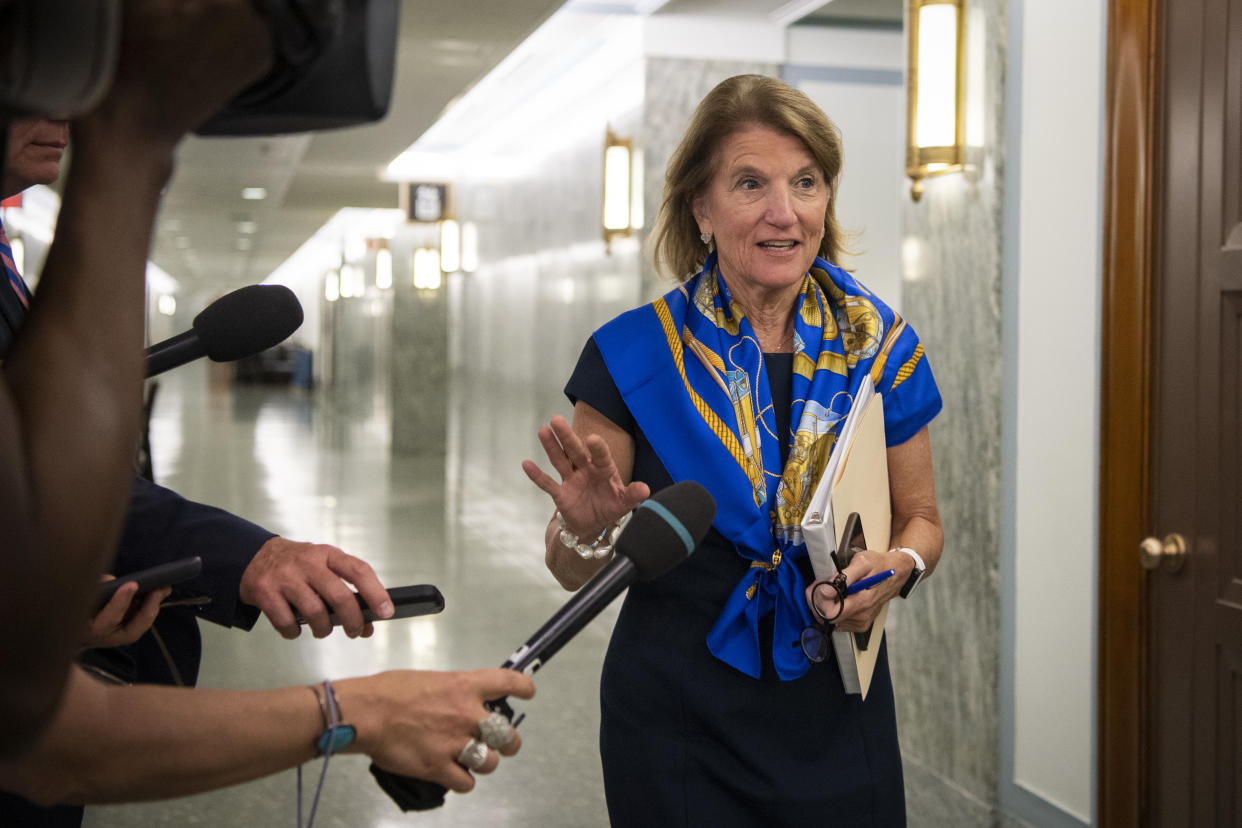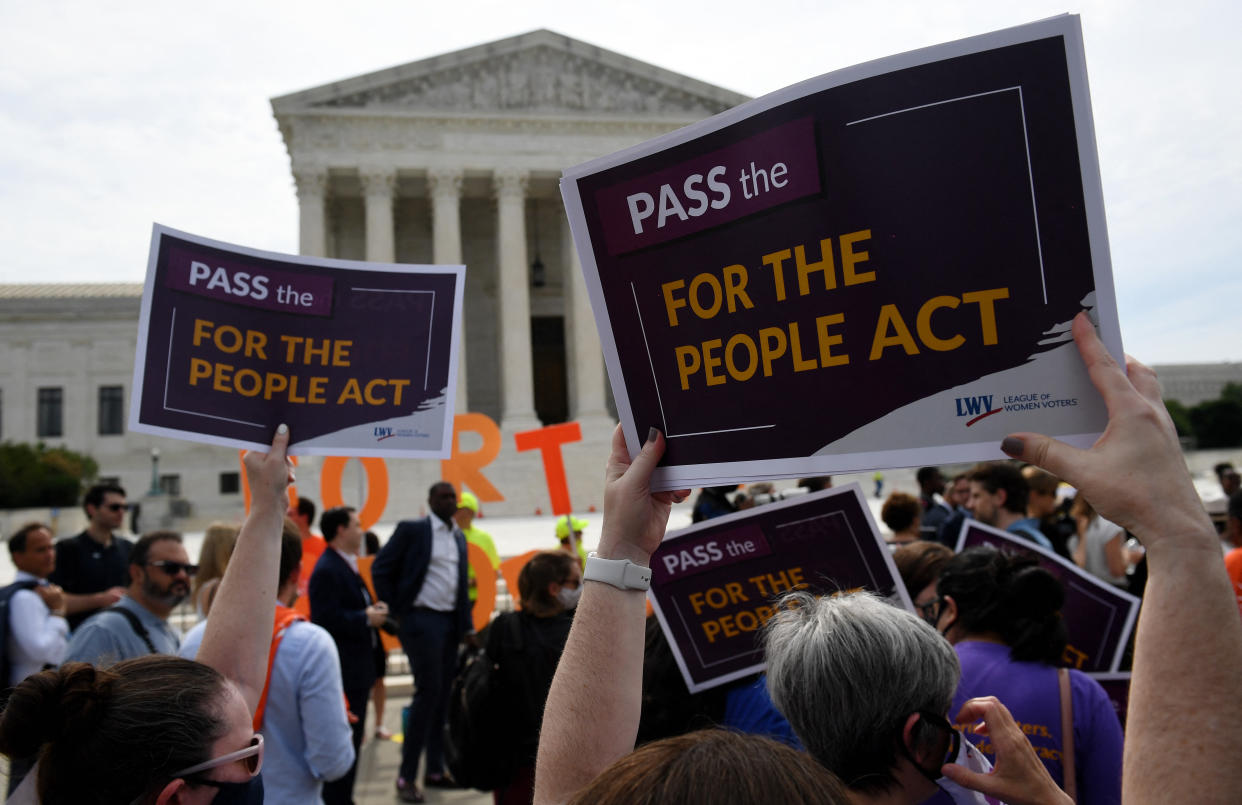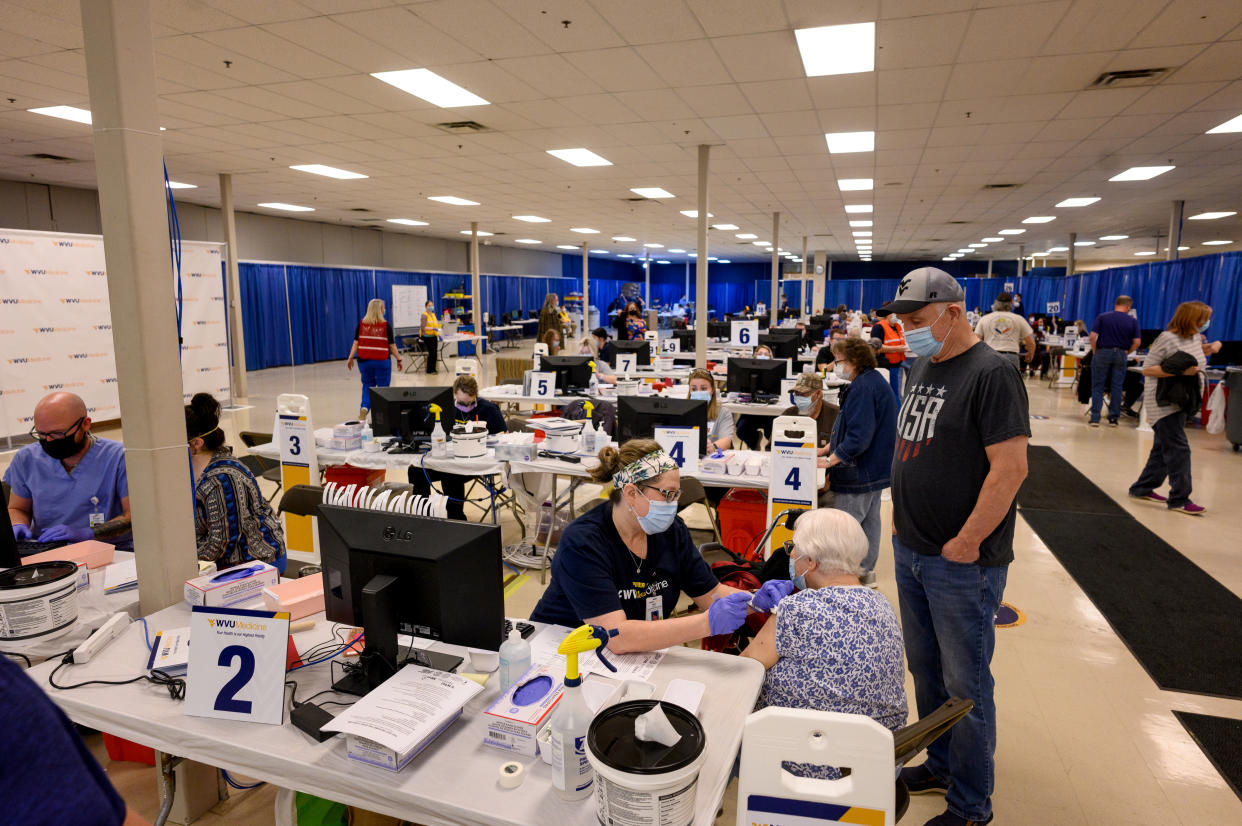Have West Virginia's senators squandered their state's moment in the sun?
WASHINGTON — On Monday afternoon, White House press secretary Jen Psaki made that rare assertion on which Democrats and Republicans can both agree. “West Virginia doesn’t usually get this much attention,” she said.
Psaki wasn’t talking about the state’s steep demographic decline or the not-unrelated decline of coal. The state has a breathtaking new national park, New River Gorge, but she didn’t mean that, either. The press secretary was also not referring to Babydog, Gov. Jim Justice’s jowly canine, who recently became the unofficial mascot of the state’s coronavirus vaccination effort.
“West Virginia” has of late meant just two people, at least as far as Washington is concerned: Sen. Shelley Moore Capito, a Republican, and Sen. Joe Manchin, a Democrat. Together the two came to hold inordinate sway over how quickly and how thoroughly President Biden is able to accomplish his ambitious but increasingly embattled legislative agenda.

What has that gotten for one of the poorest and least healthy states in the nation?
Other than Psaki’s joke, not much, it seems.
The only state created directly as a result of the Civil War, West Virginia is known as “the child of the storm.” Today it’s in the eye of a political hurricane. At a time of deep political divisions, the state’s two senators suddenly emerged this spring as key voices on key issues, including infrastructure and voting rights.
Minority Leader Mitch McConnell made Capito, the ranking Republican member of the Senate Public Works Committee, the leading GOP negotiator on infrastructure this spring. Those negotiations, however, were scuttled on Tuesday as the two sides failed to reach a deal.
“Sen. Capito was determined to reach a bipartisan agreement and negotiated in good faith throughout the entire process,” a member of her Senate staff said. “The president ended those talks, unfortunately.”
The presidential courtship had raised Capito’s profile, making her at least appear to be a compromise-curious Republican willing to talk to Biden, at a time when many GOP voters apparently don’t consider him their legitimate president. But what did West Virginia stand to gain from having one of its own lead negotiations with the president? And what did it lose when those high-stakes negotiations collapsed? (Capito will not be part of bipartisan talks expected to begin soon, but a member of her Senate staff told Yahoo News she would remain a key player in committee work on infrastructure matters.)

If those questions are difficult to answer, they’re nothing compared with those that have hounded Manchin’s refusal to endorse elimination of the filibuster, a parliamentary maneuver that allows the minority to block major legislation unless it has 60 votes. Doing so would make it easier for Democrats to pass legislation with a simple majority. Manchin is himself a Democrat, but you wouldn’t know it if you scrolled through Twitter or tuned into MSNBC this week, following his announcement that he was definitively against a raft of voting reforms known as the For the People Act.
All of which is to say that while people are talking about West Virginia, a lot of that conversation is tinged with frustration, either at Manchin’s intransigence or Capito’s lowball offers.
There is also the irony that not so long ago, West Virginia’s two senators were Robert Byrd and Jay Rockefeller, both renowned for steering large amounts of federal dollars to the state. It is impossible not to wonder where things would be had those two been in the thick of it this spring.
Instead, it was Manchin and Capito, both scions of storied West Virginia families, who found themselves wielding inordinate influence in Washington.
“It’s an accident, right?” says John Kilwein, chair of the political science department at West Virginia University, of Manchin and Capito’s sudden star turn. “I’d be surprised if they were playing the same roles a year from now.”
It might take much less time than that. “Cassidy is the new Capito,” decreed a Wednesday morning headline from Politico, a reference to Bill Cassidy, a Republican who represents another state with a complex political legacy and many funding needs: Louisiana. Cassidy is now negotiating with the White House alongside a clique of moderates, including Sens. Mitt Romney and Susan Collins, both Republicans. Manchin and Sen. Kyrsten Sinema, D-Ariz., are also part of the Cassidy group.

But Manchin may have already played his biggest hand, announcing in an op-ed published over the weekend that he believed Democrats should not approach voting rights in a “partisan manner.” He could still come around, if not on democratic reforms then on infrastructure, especially since he and Biden are somewhat close.
Only in seeking influence, he may have lost some, exasperating and confusing some of his colleagues. "He claims he is not in it for the power, but he seems to be enjoying his position way too much,” says Eric Wittenberg, an attorney and historian who has written about West Virginia. “What’s he trying to accomplish?”
He may simply be trying to survive in a state where he is the only elected Democrat. Kevin Spiker, a political scientist at Ohio University, came to West Virginia in the early aughts to do graduate work. He says he witnessed firsthand the state’s transformation from a redoubt of lunch-pail Democrats to what it is today: the nation’s foremost MAGA stronghold, which former President Donald Trump won by some 40 points in November despite failing to keep the promises he’d made to coal miners four years before. In fact, 56,000 more West Virginians voted for him in 2020 than in 2016.
Trump’s adherents, Spiker believes, might punish attempts to work too closely with Biden. That may explain why Manchin came out against the For the People Act, which many conservatives regard as a Democratic power grab. Though famous for his independent streak, Manchin is still a reliable vote for most pieces of Democratic legislation, and supported both impeachments of Trump. And while he’s not up for reelection until 2024, a poll from late last year found him with an approval rating of just 33 percent among West Virginians.

Almost any conversation about West Virginia’s influence in Washington inevitably turns to Byrd, the coal miner’s son and onetime Ku Klux Klan member, famous for his oratory, his longevity and, most important, his ability to make sure money never stopped flowing from Washington to West Virginia.
Byrd was “one of the great power brokers of the Senate,” says Wittenberg. In his 52nd and final year in office, which he did not live to complete, Byrd was responsible for 89 earmarks that sent $250 million to West Virginia, in a career that saw him direct $3.3 billion to his state. There is even a Wikipedia entry, and a sizable one at that, dedicated to all the places named for Byrd around West Virginia: the Robert C. Byrd Green Bank Telescope, the Robert C. Byrd Addition to the Lodge at Oglebay Park, ad pretty much infinitum.
Kilwein of West Virginia University agrees. “Robert Byrd would have certainly gotten something for the state,” he says. So would Rockefeller, the last Democrat to represent West Virginia before Manchin (the two served together for several years until Rockefeller’s retirement in 2015).
Manchin and Capito “come from families that are very, very deeply rooted in West Virginia politics and public service,” says Spiker of Ohio University. Manchin is the nephew of A. James Manchin, a giant of West Virginia politics who worked for Gov. Arch Moore, father of Shelley Moore.
“They’re friendly,” Kilwein says of the two senators. “It’s a small state. The elites know each other.” Capito and Manchin may also be among the most bipartisan members of the chamber. But that may not matter as much in a highly ideological age when the two parties are as far apart as they have ever been. The disappearance of earmarks makes agreement on legislation even more difficult (which is why some want earmarks to return).

Biden understood well the game Byrd played because he played it himself, on Delaware’s behalf. The two served together in the U.S. Senate for more than three decades. As vice president to Barack Obama, Biden delivered a eulogy for Byrd in 2010. “But I tell you what, you West Virginians owe a lot of people in Delaware for a lot of money we should have gotten and you got,” he said.
A decade has not dulled Biden’s sense of how things work on Capitol Hill. In late March, he appointed Manchin’s wife, Gayle, to the Appalachian Regional Commission. One didn’t have to be steeped in “House of Cards” cynicism to see that this was one Democrat doing another Democrat a solid, with a clear expectation that the favor would be returned soon.
“I can’t see how this helps him,” Kilwein says of Manchin’s stance on the filibuster, which appears to be rooted in principle — but which, like all principles, is not without political consequences.
"He claims he is not in it for the power, but he seems to be enjoying his position way too much,” says Wittenberg, the scholar and attorney. "What's he trying to accomplish?"
In a state with some of the worst health, education and poverty levels in the nation, more is at stake than Washington intrigue. “West Virginians are absolutely seeing the benefits of the American Rescue Plan, but those measures are temporary and tied to the pandemic,” says Kelly Allen, executive director of the West Virginia Center on Budget and Policy, in reference to February’s $1.9 trillion coronavirus relief package. “Once those provisions expire, the significant challenges that folks in our state have faced for many years will reemerge.”

“The payoff would be significant if you could pass the infrastructure bill,” Kilwein says.
That would be true everywhere, given the size and scope of the legislation, but it would be especially true in West Virginia. “Building roads and bridges in West Virginia is inordinately more expensive than in virtually any other state because of the mountainous terrain,” says Spiker.
Manchin will be in the room for bipartisan negotiations, but with Capito no longer a factor, the West Virginia moment appears to have passed.
____
Read more from Yahoo News:


